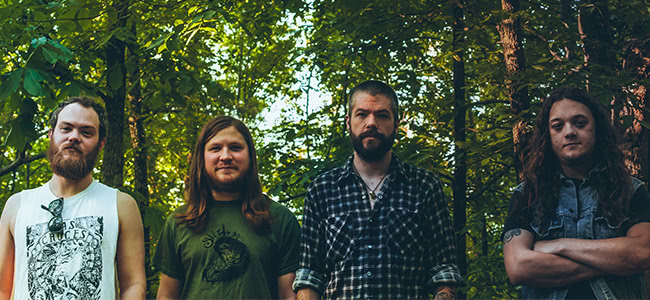The crowd was dressed mostly in black T-shirts and ragged jeans, save for the occasional flannel. You saw all the requisite fonts and logos – Sleep, High On Fire, Mastodon, Black Sabbath, Kylesa, Electric Wizard, and even the odd Burzum or Watain. So much for hipster metal.
Before the show got underway, you could hear the murmurs of friends discussing craft beer as another group dissected the merits of Deafheaven, creating an impromptu genealogical chart all the way back to Led Zeppelin and Deep Purple. It was an educated crowd, but the top name on the bill could’ve told you that.
“I think there’s this conception that metal is just rockist music with screaming and no value or depth to it. On the flip side of that, people think of like, ’80s hair metal or something,” Pallbearer bassist Joseph D. Rowland recently told Tone Deaf.
However, Joseph, like everyone that gathered inside the Ding Dong Lounge to witness Pallbearer’s first Australian performance, understands that in this day and age there’s simply no excuse for ignorance. Everyone in the crowd has heard it all before, but they know they’ve never heard anything like Pallbearer.
After assembling on stage like chess pieces, the Arkansas natives began their assault on the audience. ‘Worlds Apart’, the opening cut from their universally acclaimed sophomore effort, Foundations Of Burden, begins to cry, scream, chug, and churn, like the first ripples of a tidal wave.
‘Devoid of Redemption’ followed and all hope was gone. The deluge was well and truly coming, as punishing walls of sound were erected around the crowd, who swayed and writhed along to the ominous tale of the old man across the river. For a moment there, you could’ve sworn you saw his spirit materialise onstage.
Brett Campbell and Devin Holt traded slabs of crushing guitar riffage as Rowland formed mountains with his bass. Drummer Mark Lierly, meanwhile, proved himself to be just the kind of skilled and disciplined drummer one hears on Foundations Of Burden and the preceding tome, Sorrow and Extinction.
[include_post id=”445723″]
The band was fresh from a performance at Tennessee’s Bonnaroo Music and Arts Festival and even a metal layman could see the technical mastery that was on display. And we’re not talking about deftly sweep-picked solos or high-flying, shredded fills.
Instead, Pallbearer have mastered the language of metal, the way John Coltrane or Miles Davis mastered the language of jazz or Woody Guthrie mastered the language of folk. They avoid the grovelling obeisance to their chosen genre so endemic in metal and instead move within it freely.
Speaking of language, it would almost be difficult to describe the band’s seven-song setlist with the kinds of words normally thrown around about musical performances. Renditions of songs like ‘The Legend’, ‘Foreigner’, and ‘The Ghost I Used To Be’ were more akin to a great boxing match.
No blow went unanswered. Each jab was followed by a devastating cross and they always knew to save that big power punch — in Pallbearer’s case, a lights-out rendition of ‘Given to the Grave’ — for just the right moment, when you know you’ve got your opponent on the ropes.
Like Rowland said, “there’s this conception that metal is just rockist music with screaming and no value or depth to it”, but Pallbearer aren’t just sitting around, bemoaning the situation. They’re on the front lines, tearing down that conception piece by piece.
“Recently, I was having a discussion with Devin [Holt, guitarist], he was telling me that he’s not interested in the future of metal, he’s interested in the future of music and I thought that was a really excellent way of looking at it,” Rowland had told Tone Deaf.
Indeed, watching them live cements them not only as one of the most critically acclaimed and promising young bands in heavy metal, but one of the genre’s most vital exponents, and probably one of the most vital bands in music, too.

































